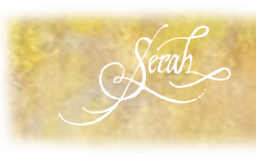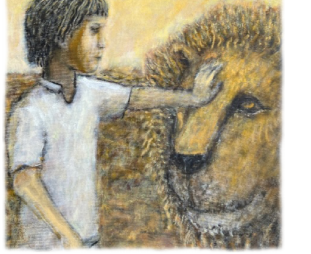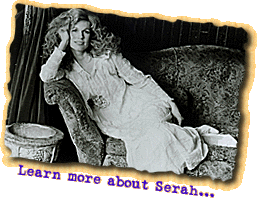

Interview
|

Q & A With Serah
Dateline: 04/16/99
Serah is a performer who knows all about the power of music in crossing cultural boundaries. Her newest album Senegal Moon has a strong African influence—no surprise since Serah lived there for a year—as well a European feel. Recorded in France (Bernard Paganotti, the bass player in Francis Cabrel's band is a co-producer), Senegal Moon is a testament to Serah's belief that music can cross cultural boundaries and lead to goddness in the world.
Paula: How did you get involved in the Hague Appeal for Peace concert? Serah: This is really a long story because I get involved with a lot of charitable projects. There’s a group called the Women’s Summit Foundation based in Geneva Switzerland. Their mission is to try to reduce, heal the problems of abuse with women and children throughout the world and they really address some of the harsher sides of it as it relates to African countries and Chinese countries and some of the countries where the abuse is so severe to both the women and children. At the conference Mikhail Gorbechev had for children’s rights and peace for the world ten years ago, they had presented one of my earlier records to him as a present and a token of those ideals. They are the ones who proposed the World Peace Conference to me. It’s a wonderful cause and will be fun doing it.
Paula: As a music artist, what do you feel is music’s most important role in promoting peace?
Serah: It depends on what the music is, and I love all kinds of music, but my ideal in music always is that it’s inspired and that it inspires man’s higher nature. I don’t mean that it has to be anything Earth-shaking, but that it moves us in that direction of making people feel good and possibly igniting higher idealism through lyrics and music. Music is a wonderful metaphor for world relation because with music you can blend the best of so many cultures and when people get rid of egos and power trips the result is wonderful music. We’ve seen this happen with so many different kinds of music. I am very intrigued with blending the African/European sound and I got inspired from that because I lived in African for a year and worked in a drought area—I did that just because I started to feel frustrated that my music wasn’t enough to do for the world and I should really do something hands on—but after doing it we had a wonderful experience where we found families for 500 orphaned children with the help of some wonderful local charity organizations. It was also an emotionally really challenging year. When I was out in the bush with the Dorobo and Trikona tribes, the music was so beautiful and I had my guitar and would play songs I was writing and they would just chime in with harmonies and ad lib rhythms and lyrics and it was so exciting and really exhilarating. I thought "one day I have to bring that into my recording experience," and I never knew exactly how it would fall together. Some years later when I was recording in Paris we started to pull it together because there is a lot of African music in Paris and we were able to bring those elements into the recording and that’s what Senegal Moon really is.
Paula: Are there other cultures you are looking at incorporating into your music besides African?

Paula: For a musician who wants to incorporate different cultures in their sound, how important do you think it is personally immerse yourself in that culture the way you did with Africa?
Serah: I think that would be individual. In terms of me I feel like I am pretty sensitive to certain things and if inspiration leads me to a certain culture, to using certain cultural sounds I don’t feel like I’d have to have lived there to feel connected. I really feel that we are all connected anyways at some level. I don’t know, what do you think?
Paula: I think you’re right. Personally, I don’t know anyone who is only one culture; we all are sort of blended in certain ways.
Serah: I love finding metaphors that cross culturally blend. Sometimes a metaphor will jump into my thought when I am writing a song and I’ll trace it and realize it’s in the Jewish culture, it’s in the Christian culture, it’s in the Muslim culture, and you can even find traces of it in the Bushman culture, Hindu culture, Buddhist culture—different metaphors that they may not be exactly the same but they are really saying the same thing and can be really similar in their story which is an interesting phenomenon.
Graphics courtesy of Great Northern Arts.

